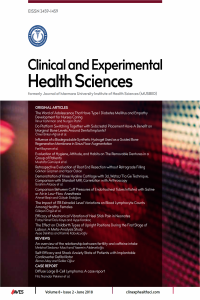Abstract
References
- Göksel EY, Nurses Observed Behaviors Are Studied According To Their Dependent, İndependent And İnterdependent Decisions Behind Them. PhD Thesis, Hacettepe University Institute of Health Sciences. Ankara; 1995: 3-4.
The Word of Adolescence That Have Type 1 Diabetes Mellitus and Empathy Development for Nurses Caring
Abstract
Objective: The research was conducted as a quasi-experimental study using
a single-group pretest post-test design to develop empathic approaches
in the nurses who care for adolescents with type 1 diabetes mellitus.
Methods: All the nurses working in the adolescent service at Farabi Hospital
Faculty of Medical Sciences at Karadeniz Technical University participated in
the study. Implementation of empathy education program was conducted
by the researcher on 8-9 August 2011. Program lasted for 16 hours totaly,
eight hours a day. Data were collected using “self description document for
adolescents,” “in-depth interview form,” “empathy data form for nurses,” and
“nurses verbal record form.” Necessary official permissions from the hospital
administrators were obtained. In the study, adolescents between the ages
of 13 and 18 with type I diabetes mellitus for at least one year participated.
Results: It was found in the study that there were little similarities, particularly
about physical subjects, between the perceptions of patient adolescents
and nurses before the training in term of patients’ feeling of being different
and stigma; their management strategies of stress, anxiety, and fear depending
on their illness; and in terms of doing risky behaviors and of dealing with
the illness. After the training, it was found that there was a big change, particularly
emotional change, in the perception of nurses in a more comprehensive
way compared to their perception before the training. In the second
phase of the study, a total of 136 verbal communications between adolescents
and nurses were recorded before the training when patients were
admitted to the hospital, during treatment and dinner. It was observed that
80.1% of these communications performed by the nurses before the education
showed characteristics of “non-empathic approach,” while 19.9% of
them showed some characteristics of empathic approach, which indicates
that nurses were more inclined to use non-empathic approaches before
the training. When the communications after the training were observed,
15.9% of 82 communications showed non-empathic characteristics, while
84.1% of them showed emphatic characteristics. According to this decrease
in the number of unempathic behaviors, it was seen that the nurses
after the training usedless unemphatic behaviors.
Conclusion: The results of the study also showed that while the level of
unempathic approaches of the nurses before the training was much higher
and they were used more often than emphatic approaches that the nurses
provided after the training. It was also seen that empathy training is quite
effective in developing nurses’emphatic behaviors.
References
- Göksel EY, Nurses Observed Behaviors Are Studied According To Their Dependent, İndependent And İnterdependent Decisions Behind Them. PhD Thesis, Hacettepe University Institute of Health Sciences. Ankara; 1995: 3-4.
Details
| Primary Language | English |
|---|---|
| Journal Section | Articles |
| Authors | |
| Publication Date | June 15, 2018 |
| Submission Date | March 22, 2017 |
| Published in Issue | Year 2018 Volume: 8 Issue: 2 |


